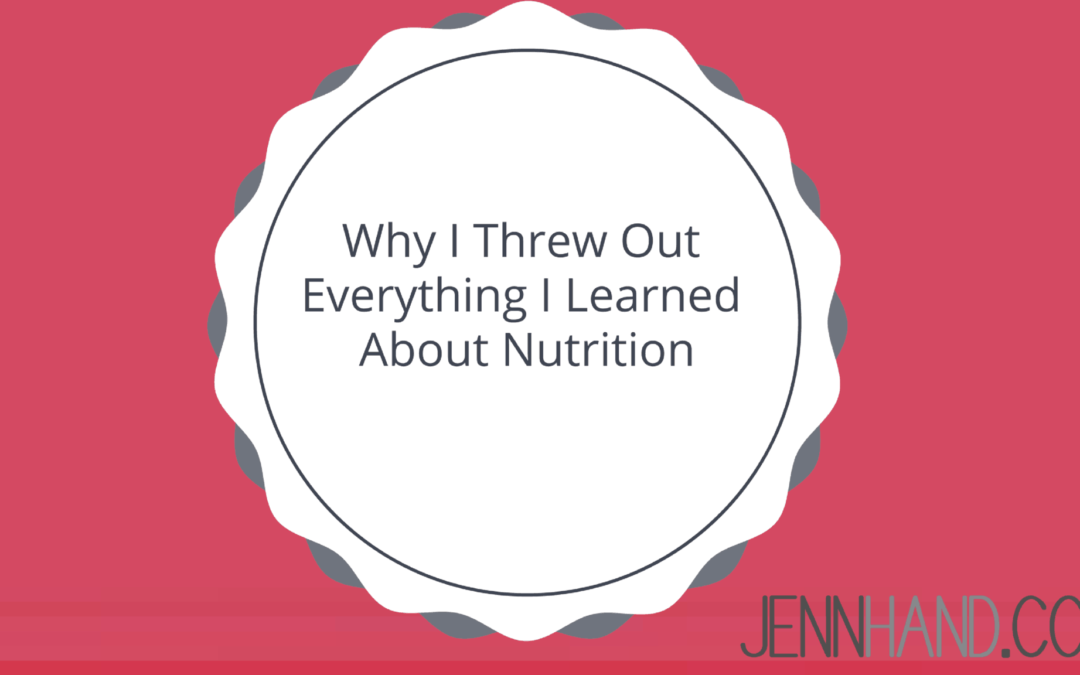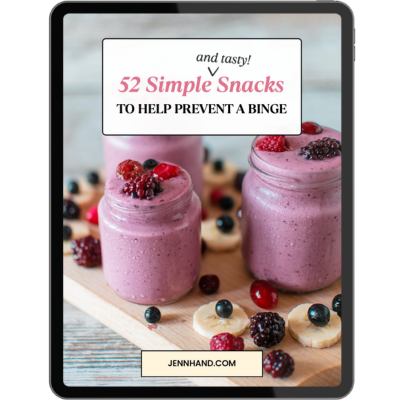I used to know everything about nutrition. I knew the calories in 95 percent of the items at the grocery store, which foods had the most omega-3s, what a plant-based diet did for the body, how food combining helped digestion improve, and which foods had the lowest fat content and fewest calories.
I spent two years in a graduate program, studying nutrition and spending most of my spare time absorbing as much information as I could about plant-based health, nutrition content, minerals/vitamins, food-related diseases, and a healthy diet.
At the same time, I was also knee-deep in battling disordered eating.
I knew I “should” be implementing everything I was learning because I saw the direct impact food has on health.
I was “supposed to” eat more plant-based foods, consume tons of vegetables, cut back on animal protein, and include fresh, whole foods in my meals.
But the reality was that I still craved candy from my co-worker’s candy dish, desired something salty every afternoon, and wanted chocolate after dinner. I would try to eat “perfectly” during the day, but by nighttime, I was spooning ice cream into my mouth by the pint.
I went to war on my body and the way I ate. I thought if I could just learn more about nutrition, my cravings would fall by the wayside, my yo-yo dieting would normalize, and I would find the freedom around food that I desperately craved.
It was a frantic battle that got worse the more nutritional information I got.
I beat myself up for not adhering to what I knew to be true and spent months thinking my solution was to bury myself deeper in nutrition books.
It took me years to realize this didn’t work. My weight fluctuated dramatically during this time, as I would commit to “clean eating” for a month, lose the weight, then binge for weeks afterward.
It wasn’t until I decided to forgo all of the nutritional information I had acquired (intellect and knowledge ruled my food decisions) and throw out what I knew that things began to shift.
While I knew intellectually that filling most of my plate with veggies was healthy, I didn’t want my food decisions to be so mind-dominated anymore.
I decided to let my BODY dictate more of my decisions instead of my intellect.
Throwing out what I knew and beginning a conversation with my body about what it wanted was life-changing. (And yes, terrifying).
I started listening to my body, and my weight naturally began to stabilize. I let go of my hard-fought battle to eat 100 percent nutritionally sound and began to understand that my body had its own wisdom inside.
Instead of fighting my cravings, I befriended them. I sought to understand what my body was trying to tell me.
And my entire world changed. I began to experience the freedom I thought a master’s degree in nutrition would give me. My diet improved gradually and naturally as a result of tuning into what my body was trying to tell me.
Knowledge isn’t necessarily a bad thing. But for me, it turned into an obsession. It started with a good intention: to eat healthy and take care of myself.
Slowly, it morphed into an unhealthy fixation on having to eat only the most nutritious foods and nothing else. My life was dominated by a fixation on food rules instead of following my own body’s wisdom.
If you find yourself getting caught up in obsessing over every morsel you put into your mouth and use your mind/intellect to make your decisions, it may be helpful to explore another approach.
Here’s why I threw out everything I knew about nutrition:
1. More knowledge can take you further away from listening to your body.
Knowing what to eat and putting it into practice are two completely different things. We have more nutritional knowledge at our fingertips than at any other time in history.
And yet, we live in an age when we struggle with our health more than ever before. This means there is a big disconnect between having that knowledge and actually implementing what we know.
More and more information puts us at war with our bodies. It cuts us off entirely from ourselves and uses only the mind to dictate what we eat. We’re feeding our bodies, and yet we use our intellect to dictate what we should be eating.
This isn’t to downplay the role of our minds. It’s to say that we need to get more in touch with what our bodies need and want and begin to allow its innate wisdom to be at the forefront of our food decisions.
This can be scary at first. When we’ve waged war on our bodies and our diet for years, we are so far removed from connecting to our internal wisdom. But we’re each born with it and it’s there inside of us.
When you can suspend your “shoulds” about what you need to be eating and instead look within to your body for guidance, you begin to trust that your body has the answers you’ve been seeking.
2. Nutritional info doesn’t take into account different needs for different bodies.
Many of the diet recommendations out there don’t take into account our individual differences. I remember being extremely confused about all the contradictory research when I was studying nutrition.
I took a course that talked about how animal protein contributes to so many of the diseases we are faced with today. So I cut out animal protein. I lost 25 pounds, got unhealthily thin, and lost my period.
Cutting out animal protein wasn’t right for me. This discovery was a startling realization that different ways of eating work differently for each person. Someone else may cut back on animal protein and it could work really well for them. Me, not so much.
Some people may be able to eat high amounts of protein while others can’t. Some individuals do well eating more grains than others. Sugar and caffeine affects everyone differently.
Nutritional knowledge doesn’t account for discrepancies between varying needs for different body types. We are all different. And if we blindly force ourselves to follow the latest nutritional claim, we get more and more out of touch with what works for US and our unique body type.
The key is to experiment with what works for YOU. How do different foods affect your body? What keeps you full and energized? What makes you feel light and satisfied?
Tune in to what’s right for your type and your life situation. There is no more important guidance than that!
3. Focusing on what you’re eating isn’t as important as HOW you’re eating it.
When you get bogged down with eating according to what’s “best” and “healthiest,” it can create a very unhealthy relationship with food.
If we base decisions solely on nutritional knowledge, we’d be eating only fruits, vegetables, whole grains, and lean proteins ( and eating “clean” 99 percent of the time). And yet, the clean-eating trend has sparked an incredible amount of unhealthy obsessions around eating.
It can set up an unhealthy cycle that goes something like this: We swear that we’ll eat clean for the week. But Wednesday hits and our co-worker has brought in fresh homemade chocolate chip cookies.
These aren’t what we’re “supposed to” be eating, but they smell so good, it makes it impossible to resist. We eat one and then another. We feel guilty because we went “off” our food regime.
So we swear to begin again tomorrow but decide since we aren’t going to be eating cookies again, we may as well get in as many as we can today (and end up eating six more).
Cue this cycle on repeat.
But what’s more important than WHAT you’re eating is HOW you’re eating it. If you ate one cookie mindfully and savored every morsel, you wouldn’t need seven more cookies.
When you slow down and tune in to your body, you make your decisions with a greater sense of awareness. And this is how gradual, lasting change takes place.
You choose foods from a deeper sense of awareness and consciousness. You understand more of what goes on in your body because you’re paying more attention. Eating slowly and mindfully and being in the moment become more important than following a food rule you imposed on yourself.
And this is where freedom happens. You no longer become a slave to adhering to the latest fad or nutritional claim. Your body wisdom is now what guides you.
Knowledge can be power. But when the desire to adhere to a strict, rigid way of eating supersedes your desire to understand what your body needs, it can shift into something that doesn’t serve us.
Obsessing over nutrition and following certain rules paralyzed me for so many years. I became ensnared in a desperate battle with my body and myself. It wasn’t until I let go, threw out what I knew, and began to listen to my own innate wisdom that I finally found the freedom I had been seeking all along








As a post war child I was taught to eat everything on the plate. Years later after every advice, professional and otherwise. Yo Yo weight gains and loss. Now Type 2 diabetes and another load of advice which is so contradictory. Fed up and given up. I realised today I still eat what is put in front of me to eat for others approval – not for myself. I’ll start again mindful eating for me. At least it will be up to me and in my control this time. DB
Yes! Great realization about eating for others. Mindful eating can definitely help slow you down to eat from and for YOU. 🙂
This is so me , a friend of mine calls it food noise( all conflicting food rules). I love your advice !
Today I woke up and I was thinking about chocolate. I am having my period ( I associate wanting chocolate with that). I am stressed because my dad is sick ( I try to figure out maybe this is the reason why yesterday I ate the whole bag of cookies, more cookies, yogurt and milk chocolate and I was hiding from my husband. Then we had nothing interesting to do. I was full and feeling sooo bad but had half a medium pizza. When I got home I had more chocolate.
I feel disconnected with my body, I feel bad in my body. December is around the corner and I want to look my best. 🙁
It is very hard for me to eat slowly and taste my food. I don’t know why. It is as someone else is rushing me to finish.
Because I gained a lot of weight I feel I have eyes around me when I eat.
Keep taking it day and day and focusing on eating slowly, and allowing yourself to find pleasure in your food!
I’m so glad you enjoy it 😉